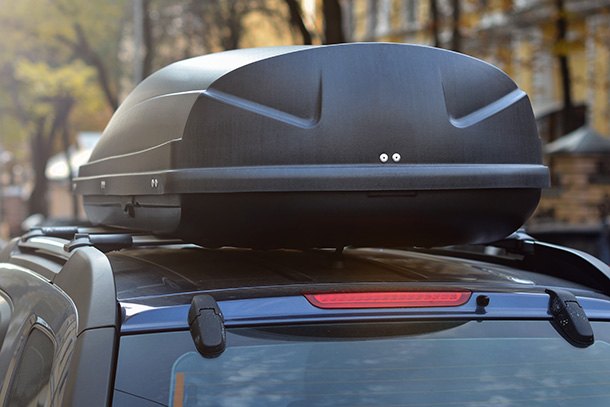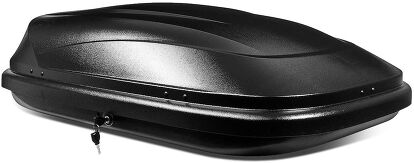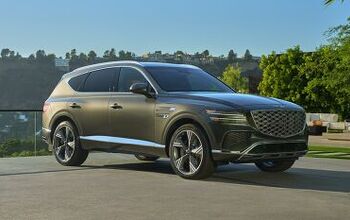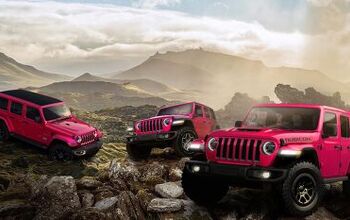Best Rooftop Cargo Boxes: Storage Wars
Top 8 Best Rooftop Cargo Boxes
Installing a rooftop cargo box is the vehicular equivalent of donning a backpack before heading into the woods. Its extra space either frees up other areas of the car for humans or permits the purchase of every Elvis bust you find between here and Graceland.
It’s worth keeping in mind the soft-sided bags on this list are easily accessed by thieves with long legs and a sharp knife. Removing the bag and taking it into a secure area during overnight stops is a good idea. Whether the thief decides to cut into the bag or slice off the straps and make off with the whole this, your stuff is at risk.
Any accessory that is lashed to the exterior of a vehicle needs to be well-secured and tightened down in such a way as to rival security measures at Fort Knox. Anything less than a solid and thorough install can result in roadway calamity if the rooftop carrier lets go and flies off into traffic. Best not test the legalities of that situation.
Here are an array of rooftop storage boxes which, like an Old El Paso kit, contains both hard and soft shells.
Table of Contents
-
Editor's Choice: Auto Dynasty Waterproof Roof Top Mount: Shop Now
-
ECWKVN Car Rooftop Cargo Carrier: Shop Now
-
RoofBag Premium Triple Seal: Shop Now
-
Thule Motion XT Rooftop Cargo Carrier: Shop Now
-
Toolguards Car Top Carrier : Shop Now
-
Midabao Thickened Waterproof Car Rooftop Carrier: Shop Now
-
RoofPax Car Roof Bag: Shop Now
-
Thule MultiLift Storage System: Shop Now
1. Editor's Choice: Auto Dynasty Waterproof Roof Top Mount
It would seem that, for once, an off-brand replica of an expensive product is actually worth considering. Ratings on this totally-not-a-Thule rooftop cargo container are overwhelmingly positive from the handful of customers who have chosen to leave a review. It is consistently praised for providing the type of functionality usually found in products that are much more expensive.
Made from heavy-duty ABS plastic, it opens over a foot wide and has a total of 10 cubic feet of storage capacity. The lid opens from the side and apparently stays open until the operator closes it, preventing knocks to the head or scythed digits. Overall dimensions are generous and the styling makes it look like more than just a box on the roof.
Pros
- Slippery styling, attractive price, hard shell security
Cons
- Snobs will point out it is not a brand name
Bottom Line
- Ignore the haters and save a couple of bucks
2. ECWKVN Car Rooftop Cargo Carrier
Inscrutable brand name aside (can I buy a vowel, Pat?), this carrier has a lot going for it as described. Made from heavy-duty coated tarpaulin with a welded dual seam, its urethane coated zippers and hook & loop closure located on the flap should keep out most weather. Also helpful in that regard is a PVC inner liner.
The seller asserts its size is ideal for all types of vehicles, but drivers of an original Austin Mini might dispute that given the bag's 51" x 39" footprint. It does have a generous height, well over a foot, providing plenty of storage space - almost 20 cubic feet, in fact. Straps are included for use on cars with our without roof racks.
Pros
- Large capacity, good ratings
Cons
- Just try and pronounce that name
Bottom Line
- Made of stern stuff
3. RoofBag Premium Triple Seal
Including an option with a solid string of good reviews is important in this series, so we present this not-creatively-named unit from, ahem, RoofBag. Well, at least it does exactly what it says on the package. This one is claimed to be 100 percent waterproof, so go ahead and chase that wild weather. The seller says there’s no need for a roof rack in order to mount this bag securely on your car’s roof but does recommend placing a soft mat between the bag and roof to avoid scratches.
It’s worth mentioning that RoofBag comes in two sizes, 11 and 15 cubic feet, so be sure you’re ordering the right one to fit your car before hitting the buy button. Its strapping system is designed to pass through slips on top of the bag, rather than pulling down on loops along its edge. This should prevent it from ripping out of place at highway speeds. Bonus: this bag is manufactured in the USA.
Pros
- No need for a roof rack, waterproof, two-year warranty
Cons
- Annoyingly large advertising printed on the bag
Bottom Line
- Literally does what it says on the box
4. Thule Motion XT Rooftop Cargo Carrier
Thule is probably one of the best-known brands in this segment, having positioned itself as a premium offering in the car accessory biz. This thing is no different, costing an absolute fortune and looking like something out of Batman’s personal collection.
In this case, however, it does seem that you get what you pay for. Dual side hinges permit it to be opened from either the driver or passenger side of the car and load capacity is a stunning 165 lbs. Three sizes are available, the largest of which can contain 22 cubic feet of gear (but still only 165 lbs) and weighs over 50 lbs empty.
Pros
- Great name, well built, looks like a Batman weapon
Cons
- Eye-wateringly expensive
Bottom Line
- Go for broke if you’ve got the scratch
5. Toolguards Car Top Carrier
Despite first-glance appearances, this car rack roof system is made of heavy-duty coated tarpaulin & fabric-guarded coated zippers. Its design permits the thing to be affixed to cars with baskets, full racks, side rails only, or no roof rack at all. The latter might produce scratches, because it's in direct contact with the paint, no matter what the seller says about a protective mat.
Those cam buckles look stout, as do the tie-down points themselves, meaning it isn't likely this product is going to self-immolate at highway speeds and deposit your priceless vintages all over the tarmac. Reviews are largely positive given the nearly 2200 ratings, with 4- or 5- stars being offered by over 80% of customers.
Pros
- Cavernous interior, makes an attempt at aero
Cons
- Hideously ugly, promise of reduced "full" consumption
Bottom Line
- Slap a few novelty stickers over that branding
6. Midabao Thickened Waterproof Car Rooftop Carrier
This carrier has a square footprint of 51 inches by 39 inches, providing about 20 cubic feet of storage atop your car or crossover. Designed to be lashed to an existing roof rack, or simply plopped on the roof itself, this unit uses adjustable straps for attachment. When it’s not in use, just remove it and fold the thing up for storage.
The ad touts heavy-duty zippers but, as with most soft-sided units on this list, it can be defeated with a sharp knife. Keep that in mind if you’re leaving the bag mounted atop your car during an overnight motel stop. The entertainingly-named Midabao is rated as waterproof, but it's never a good idea to put valuable electronics up there if you plan on driving through a rainstorm.
Pros
- Well-priced, large storage capacity, positive reviews
Cons
- Not the most attractive thing in the world
Bottom Line
- Frees up interior space
7. RoofPax Car Roof Bag
In a shocking moment of honest branding, this soft-sided carrier constructed out of tarpaulin materials is actually called a bag. The bright orange branding right on its forward-facing surface not only shouts the company name but also features a cheeky outline of a Beetle that's just different enough from reality to avoid the copyright lawyers. Maybe.
There is no shortage of reviews, racking up a 4.6 out of 5-star rating from very nearly 2000 customers. Pricing is reasonable is not stellar, though this does seem to be a segment of product in which (most times) a person gets what they pay for. It boasts dual seam technology and a water repellent double coating.
Pros
- Extra-large size, your stuff will stay dry in most conditions
Cons
- Infernal exterior branding
Bottom Line
- Works with or without a roof rack
8. Thule MultiLift Storage System
Your author is tossing this unit in at the end of our list because those of you who decide to pop for a hardshell cargo carrier are likely to take the time and store it properly when the thing is not in use. This goes double if you spend four figures on a Thule unit.
Basically, a suspension rig that cradles a hard-sided cargo rooftop box from the ceiling of one's garage or storage unit, this thing has a built-in winch-style lifter that can bear up to 220 pounds. It is preassembled but don't forget to mount this item into joists when installing it on the ceiling; simply punching through sheetrock just won't do.
Pros
- Safe storage for your expensive rooftop box, frees up floor space
Cons
- Yet another expense for your road trip largesse
Bottom Line
- Make sure to install it properly
FAQs
Which roof box is most aerodynamic?
All roof boxes are made keeping aerodynamics in mind so they can comply with the market needs. However, while some of them are manufactured in a way that they have more drag when the vehicle is moving, others move swiftly through the air, thus consuming less fuel when in use.
With that said, the following points explain what makes roof boxes more aerodynamic:
Dimensions
A roof box that is short in height is more aerodynamic as compared to the taller one. If you need more storage capacity, consider preferring a longer box. This will reduce a significant amount of drag while you’re driving.
Shape
Make sure that the roof box that you are planning to buy is tapered at the front. This makes your car move swiftly, with less drag. To understand the physics behind it, you can take the example of a paper plane that is pointed from the front and has a broader rear portion. Such a shape makes an object aerodynamic, and the roof boxes are not any exception either.
Form Factor
In addition to having a long roof box rather than a taller one, you may also want to ensure that it is thin and not too wide.
Simply put, a long and thin roof box with a tapered front is the most aerodynamic container that you can find on the market.
Additional Tip
After installing a roof box, make sure not to put cargo in it to its full capacity. This will not only make your car overloaded but will also add more drag to the air resulting in more fuel consumption.
How do I choose a rooftop box?
If you want to have a rooftop box that is spacious, aerodynamic, and easy to store when not in use, you must look for the following characteristics while buying one:
Measurements
Measurements of a roof box are most important because the one with the correct shape and size not only helps your car to drive smoother but also consumes less fuel. Therefore, you must ensure that the roof box is long (not tall), is tapered at the front, and is thin. A container with all these attributes will have enough storage capacity to accommodate a sufficient amount of cargo.
Economic on Real Estate
Check if the roof box that you are planning to buy is flexible enough to store in your garage when not in use. With this in mind, a soft cargo box would be a good choice as it can be folded and expanded as needed.
Durability
Check the material the roof box is made of and make sure that it is of good quality so it isn’t prone to wear and tear, at least not that easily.
Ease of Accessibility
Before buying, confirm that the roof box can be installed and uninstalled easily so you can save your energy and time for the journey.
If the rooftop box that you are planning to buy has all the above attributes, you can safely go for it.
Are rooftop cargo bags safe?
Yes, they are, as long as they can check the following boxes:
They are made of quality material
They are not overloaded with the heavy cargo
The cargo isn’t sharp or too hard to damage the roof of the car
They are properly strapped to the car
Which cargo carrier is best?
Some of the best cargo carriers with a decent number of positive reviews on Amazon are listed below:
Thule Motion XT ( Buy here!)
This is a spacious carrier with a perfect aerodynamic shape. The rooftop box comes in three sizes, namely Large (16 Cu Ft), XL (18 Cu Ft), and XXL (22 Cu Ft).
Yakima – EasyTop ( Buy here!)
This set of rooftop racks is best suited for sports lovers and athletes as it can easily carry surfboards, skis, snowboards, etc., and is even easy to install and uninstall.
From time to time, TTAC will highlight automotive products we think may be of interest to our community. Plus, posts like this help to keep the lights on around here. Learn more about how this works.
(Editor’s note: This post is meant to both help you be an informed shopper for automotive products but also to pay for our ‘90s sedan shopping habits operating expenses. Some of you don’t find these posts fun, but they help pay for Junkyard Finds, Rare Rides, Piston Slaps, and whatever else. Thanks for reading.)
[Main photo credit: alexfan32 / ShutterStock.com. Product images provided by the manufacturer.]
More by Vivek Nayyar
Latest Car Reviews
Read moreLatest Product Reviews
Read moreRecent Comments
- 3SpeedAutomatic What If Scenario:When VW purchased Navistar, they also got the Travelall as well as the Scout brands. I would like to see a Travelall EV to compete with the Ford Exposition and Chevy Suburban/Tahoe. I understand that Rivian R1S is supposed to handle this in a up scale market, but a Travelall would pull in more the middle class late adopters sitting on the sidelines. 🚗🚗🚗
- Arthur Dailey Do the original owners keep these vehicles because they are reliable, or because they like them or because they (the owners) are cheap? Aren't the reasons also important?
- Theflyersfan I thought the longest lasting car was a Nissan Altima with a wailing CVT, mismatched bumpers, faded paint, bubbling tint, and the smell of skunk weed burned into the torn upholstery. They are the cockroaches of the auto kingdom. They had to beat out the Chevy Cavalier for that title.
- Keith Wobbema Insurance and registration costs are no longer falling. Due to the cost of new and late model cars owners are keeping and driving them as long as possible. I have Toyota's and on average drive them 10 to 15 years.
- Tassos While the results are not surprising, they only have data for the FiRsT OWneR, who buys the car new and measure how long that ONE OWneR holds on to it.................. BUT THIS IS NOT THE sAme TO VEHICLE LONGEVITY. ....................If you include ALL OWNERS and measure the TOTAL LIFE OF THE CAR, the longest lived are Luxury and Ueber-luxury Mercs, Porsches, Rollses and Bentleys. Here in my summer home (it's an upscale resort) Mercs are as frequent as... Hyundais or even Toyotas. AND Many of these Mercs are well-maintained cars from the 2000s, like my 2008, the 90s, AND the 80s (45 year old cars!) AND I sometimes see some from the SIXTIeS! 65 years old, used as DAiLY DRIVERS!









































Comments
Join the conversation
Or buy a little two wheel tagalong trailer that uses a class 1 hitch, that sits behind your car
The sponsored content would be okay if the titles would stop having "Best" in them. Nobody involved in producing or publishing these lists is doing a comparative test on the items in the lists.